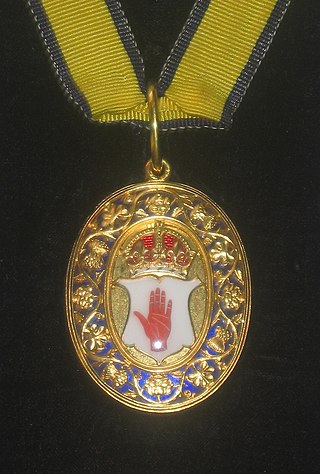Related Research Articles

Miles FitzWalter of Gloucester,1st Earl of Hereford was a great magnate based in the west of England. He was hereditary Constable of England and Sheriff of Gloucestershire.
Aidan Merivale Crawley was a British journalist,television executive and editor,and politician. He was a member of both of Britain's major political parties:the Labour Party and Conservative Party,and was elected to the House of Commons as a Labour MP from 1945 to 1951,and as a Conservative MP from 1962 to 1967.

Flaxley Abbey is a former Cistercian monastery in England,now a Grade I listed manor and private residence,near the village of Flaxley in the Forest of Dean,Gloucestershire. It is the former seat of the Crawley-Boevey Baronets.
Walter of Gloucester was an early Anglo-Norman official of the King of England during the early years of the Norman conquest of the South Welsh Marches. He was a sheriff of Gloucester and also a Constable under Henry I.
Roger Fitzmiles,2nd Earl of Hereford,was an English noble who played an active and influential part in the wars between Empress Matilda and King Stephen.

The Barrow,later Crawley-Boevey Baronetcy,of Highgrove in the County of Gloucester,is a title in the Baronetage of Great Britain. It was created on 22 January 1784 for Charles Barrow,Member of Parliament for Gloucester,with remainder to Thomas Crawley-Boevey,who succeeded as second Baronet. Crawley-Boevey was husband of Ann,granddaughter of Thomas Barrow,brother of the first Baronet. His grandfather Thomas Crawley had on inheriting Flaxley Abbey in 1726 assumed the additional surname of Boevey. Flaxley Abbey had been purchased in 1648 by the merchant,lawyer and philosopher James Boevey (1622–1696) and his half-brother William Boevey. The second Baronet was succeeded by his eldest son,the third Baronet. He was High Sheriff of Gloucestershire from 1831 to 1832. His grandson,the fifth Baronet,was High Sheriff of Gloucestershire in 1882.

Sir William Courtenay,1st Baronet was an English politician.

Catherina Boevey (1669–1726),was a philanthropist.

James Boevey (1622–1696) was an English merchant,lawyer and philosopher of Huguenot parentage.
The 1912 Birthday Honours were appointments in the British Empire of King George V to various orders and honours to reward and highlight good works by citizens. The appointments were made to celebrate the official birthday of The King,and were published on 11 June 1912.
The New Year Honours 1916 were appointments by King George V to various orders and honours to reward and highlight good works by members of the British Empire. They were announced on 1 January 1916.
The 1931 New Year Honours were appointments by King George V to various orders and honours to reward and highlight good works by citizens of the United Kingdom and British Empire. They were announced on 30 December 1930.

William Hartley Carnegie was an Anglican priest and author. In addition to parish ministries and chaplaincy,he served as Archdeacon of Westminster from 1918 to 1919 and as sub-dean of Westminster Abbey from 1919 to 1936.
Sybella Mary Crawley-Boevey (1851-1911) was a British author of Victorian fiction novels. They are mostly out of print.
The Queen's Birthday Honours 1900 were announced on 23 May 1900 in celebration of the birthday of Queen Victoria. The list included appointments to various orders and honours of the United Kingdom and British India.
The King's Birthday Honours 1931 were appointments by King George V to various orders and honours to reward and highlight good works by members of the British Empire. The appointments were made to celebrate the official birthday of The King. They were published on 2 June 1931.
The 1943 New Year Honours were appointments by King George VI to various orders and honours to reward and highlight good works by citizens of the United Kingdom and British Empire. They were announced on 29 December 1942.
The 1903 New Year Honours,announced at the time as the Durbar Honours,were appointments to various orders and honours of the United Kingdom and British India. The list was announced on the day of the 1903 Delhi Durbar held to celebrate the succession of King Edward VII and Queen Alexandra as Emperor and Empress of India. The membership of the two Indian Orders were expanded to allow for all the new appointments.
The 1911 Delhi Durbar was held in December 1911 following the coronation in London in June of that year of King George V and Queen Mary. The King and Queen travelled to Delhi for the Durbar. For the occasion,the statutory limits of the membership of the Order of the Star of India and the Order of the Indian Empire were increased and many appointments were made to these and other orders. These honours were published in a supplement to the London Gazette dated 8 December 1911.

General Sir Robert Phayre G.C.B. was a General in the Indian Army who served most of his military career in India including in the First Afghan War,the Second Afghan War,the Indian Mutiny and who was Resident at Baroda from 1873 to 1874 during which period Maharaja Malhar Rao Gaekwad,precipitated the Baroda Crisis and then attempted to poison Phayre,by putting arsenic and diamond dust in his sherbet.